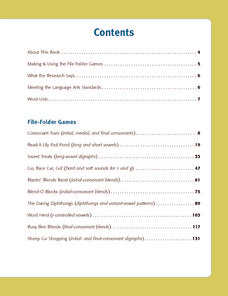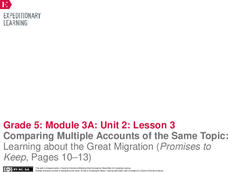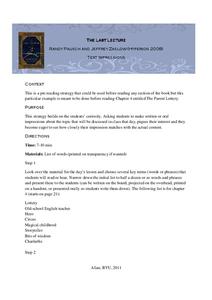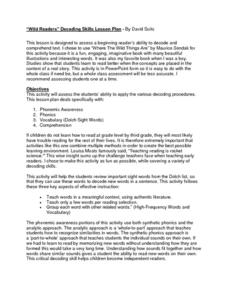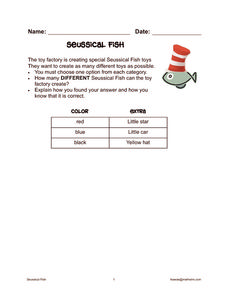Mari
Word Herd
Practice r-controlled vowels with a phonics game and worksheet. After rolling the dice, kids land on spaces on the game board and then find the matching r-controlled word in their stack of cards.
EngageNY
Analyzing Character: Louie Zamperini
Let's talk! Scholars create discussion appointments using map locations. After completing their appointment books, readers look closely at a few Unbroken pages. They use sentence strips to record details from their readings that help...
EngageNY
Mid-Unit Assessment: Research
Middle assessment for the Middle Ages. Scholars complete a mid-unit assessment by reading and answering questions about three different text pertaining to the Middle Ages. Learners work independently on the assessment for the class period.
EngageNY
Using Quotes to Explain: Why Philo Farnsworth Invented Television
Television or radio? Scholars read pages 18-28 of The Boy Who Invented TV: The Story of Philo Farnsworth to discover why Farnsworth thought TV was better than radio. They determine the gist of the section and then look closer at why...
EngageNY
Comparing Multiple Accounts of the Same Topic: Learning about the Great Migration (Promises to Keep, Pages 10–13)
Get the story straight. Scholars gather information about the Great Migration as they listen to a reading from Promises to Keep. They then examine the text to find evidence to support the feeling of resentment. Learners take part in a...
EngageNY
Getting the Gist: Steve Jobs Commencement Address (Focus on Paragraphs 6-8, and connecting to Chapter 6)
As part of a unit study of Bud, Not Buddy, readers compare Buddy's list of rules to live by with those that Steve Jobs enumerates in his commencement address to Stanford's 2005 graduating class.
EngageNY
Pitching Your Claim with Best Evidence
Does Bud use his rules to survive or thrive? That is the driving question of a lesson plan following the reading of Bud, Not Buddy by Christopher Paul Curtis. In an argument essay prewriting activity, pupils use textual evidence to...
EngageNY
Using Effective Search Terms: Researching Water Management
Discover how to use search terms effectively! Scholars continue their exploration of Charles Fishman's The Big Thirst, engaging in a read aloud and then answering text-based questions. Next, pupils learn about using search terms and...
EngageNY
Informational Text Features: Analyzing “Hawaii’s Endangered Happy Face Spider”
Some things are better the second time around. Scholars reread an article about Hawaii's happy face spider, answering text-dependent questions as they read. Then, they use a Venn diagram to compare the text features of interviews and...
Curated OER
The Last Lecture: Text Impressions
To pique interest in The Last Lecture, readers are given a list of key terms and ask to craft a story inspired by the terms.
Curated OER
Crossword Puzzle for Harry Potter and the Chamber of Secrets
Chapter 10 of J.K. Rowling's Harry Potter and the Chamber of Secrets holds a cache of words perfect for this crossword. Learners read the definitions and write in the correct words.
Curated OER
The Lion, the Witch, and the Wardrobe: Vocab Squares
Creatively develop and reinforce new vocabulary from the book, The Lion, the Witch, and the Wardrobe by C.S. Lewis, using these vocabulary squares. Each square is divided into four quadrants asking scholars to input the word, a picture,...
Curated OER
Goldie Girl and There, Their, and They're: Homophones and Homographs
Instruct your class on homonyms and homophones. Learners take a pre-test and examine a list of homophones. They also play online word games to practice spelling and usage and write a fairy tale in which they use at least 10 homophones....
David Suits
“Wild Readers” Decoding Skills Lesson Plan
Set young readers on the path toward fluency with this phonemic awareness resource. Based on the award-winning children's book, Where the Wild Things Are, this lesson allows beginning readers to practice isolating phonemes and...
Curated OER
Hatchet: Predicting the Outcome Guide
What will happen in Hatchet by Gary Paulsen? Kids read a series of possible events that will occur in the novel and mark whether they agree or disagree with the probability of each event happening.
Curated OER
Unknown Numbers in Sums and Differences
Your new mathematicians may think word problems sound scary, but this introductory set of scenarios will leave them feeling accomplished in their addition and subtraction skills! Learners read seven word problems, each requiring them to...
Mathwire
Seussical Fish
Wondering what Dr. Seuss and his colorful fish have to offer your young mathematicians? Find out with this simple yet affective word problem worksheet that challenges children to determine how many different combinations of toy fish can...
Curated OER
Sounding Out CVCE Words
First graders explore vowels and consonants by participating in a flash card activity. In this phonetics instructional activity, 1st graders discuss the difference between short and long vowels and identify them within a story told to...
Curated OER
Vocabulary Reading Test Lesson 4-II
In this recognizing twenty-four vocabulary words worksheet, students use the four lists of words to write them from oral definitions and to create a complete sentence. Students write 25 answers.
Curated OER
Rhyming Words
In this English worksheet, students read a list of rhyming words. One list groups rhyming words with the long a sound. A second list groups words with the long o sound.
Curated OER
Rhyming Words
In this rhyming worksheet, learners read groups of rhyming words. The first list included words with the sound you hear in by. A second list has rhyming words with the sound you hear in cow.
Curated OER
Build a Word
Students explore new words through letters or letter groups. In this lesson about words, students use index cards to build new words. Each index card contains one letter or letter group. Students utilize different strategies like...
Curated OER
Spelling List 20: Sight Words, Long /o/ Words, and Academic Vocabulary
In this spelling list worksheet, students practice spelling words that are sight words, long o words, and vocabulary. Students practice spelling 21 words total.
Curated OER
Spelling List 23: Sight Words, Long /u/ Words, and Academic Vocabulary
In this spelling list instructional activity, students practice spelling words that are sight words, long u words, and vocabulary. Students practice spelling 21 words total.


